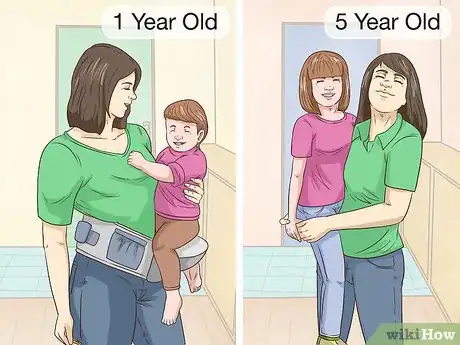This article was co-authored by Steven Hesky, PhD. Dr. Steven Hesky is a Licensed Clinical Psychologist with over 37 years of experience. He specializes in long-term psychotherapy with adults and adolescents. His training includes Freudian, Jungian, and Existential approaches to psychotherapy, hypnosis, family therapy, marriage counseling, and biofeedback. Dr. Hesky holds a BA in Philosophy from Lake Forest College and an MA and PhD in Existential Clinical Psychology from Duquesne University.
There are 7 references cited in this article, which can be found at the bottom of the page.
This article has been viewed 21,012 times.
Being separated from your child is hard, no matter what the reason. You might be a new mom returning to work after maternity leave, you may have to go on frequent business trips, or your child might be getting ready to leave for college. It’s normal to feel sad, anxious, and worried when your child is away, but there are things you can do to cope with these emotions, maintain your connection with your child, and make the transition easier on them, too. With some extra effort and time, you can both adjust to this new phase in your lives.
Steps
Coping With Your Emotions
-
1Acknowledge that it is okay to feel what you are feeling. It is normal to feel sad, anxious, worried, or just plain bad when you have to spend time away from your child. Don’t criticize yourself for your feelings. Allow yourself to feel what you are feeling and tell yourself it’s okay.[1]
- Try writing about how you feel being away from your child, such as in a journal.
- You could also draw or play music to express how you are feeling if you prefer.
Tip: Remind yourself that missing your child is a sign you’re a good parent. You miss them because you are very close. It would only be abnormal if you didn’t feel any anxiety, sadness, or worry while your child was away.[2]
-
2Take some deep breaths to help calm your anxiety. If you are feeling overly stressed or anxious due to being away from your child, take a few minutes to breathe deeply. Inhale through your nose to the count of 4 and then exhale slowly to the count of 8.[3]
- Repeat this breathing exercise for about 3 to 5 minutes, or as long as it takes for you to feel relaxed.
Advertisement -
3Talk with other parents who are in the same situation. If you have a friend or family member who also has to spend time away from their child, call them up to talk. They might be able to relate to what you’re going through and possibly even offer some advice for how to cope.[4]
- Arrange to meet for coffee or lunch with another parent who is in the same situation as you.
- Look for support groups in your area for parents in the same situation, such as groups for divorced parents, empty nest parents, or working parents.
- Check out an online forum if you can’t find a local support group.
-
4Stay busy with your own interests. The benefit of having time away from your child means that there will be more time for you to focus on yourself. This is not a bad thing! In fact, it’s healthy for you to focus more on yourself while your child is away. Use the extra time to do things that you need and want to do.[5]
- Plan more social outings with friends, or join a special interest group to make new friends.
- Take up a new hobby or learn a skill by taking a class.[6]
- If your child has left for college, it may be an opportunity for you and your spouse to develop a life separately from your child and reconnect with each other.
-
5Talk to your doctor or a therapist if you are struggling with the changes. If spending time away from your child is causing you to feel depressed or anxious, talk with someone who can help. Whether the separation is short-term or long-term, being away from your child is hard. It’s important to get help to cope with this transition in a healthy way.[7]
- Your doctor may prescribe a medication for depression or anxiety if the emotions you’re experiencing are interfering with your daily life.
- You can also work with the therapist to talk through your emotions and learn about healthy coping techniques that you can use.
Staying Connected to Your Child While They’re Away
-
1Keep a picture of your child with you at all times. Place the picture on your desk at work, keep it in your purse or on your keychain, or use a picture of your child as the lock screen image on your phone. Being able to see your child’s face whenever you are missing them can help you to feel closer to them.
- You might also bookmark a special video of your child on your phone that you can watch when you are missing them.
Tip: If you think that watching a video or looking at pictures of your child might upset your more, then don’t do this. Look for ways to distract yourself instead.
-
2Pack a special toy or comfort item for your child. To help your child feel closer to you while they are away, pack a special toy, blanket, or other item in their bag. This will help them when they are missing you, and it will also help you to feel more connected with them.
- A note is also a nice way to connect with your child while they’re away. For example, you could write a note and pack it in your child’s backpack or send it to them in the mail.[8]
-
3Schedule regular communication via phone or video chat. It’s important to keep in touch with your child while they are away, so make sure that you set up a regular time to talk with them. Depending on what works best for you and your child, you can set up a daily, biweekly, or weekly conversation via phone or video chat.[9]
- For example, if you are away from your child due to a business trip, then you might arrange to talk to them before they go to bed each night.
- If you are away from your child because they have gone off to college, then it might be more realistic to set up a weekly phone call or video chat.
- Texting and email are also a good way to communicate with teenagers or young adults.
-
4Visit your child when possible if you are away from them long-term. If your child has gone off to college or boarding school, then you may be facing weeks or even months away from them. To make this easier on both of you, look for an opportunity to visit them during this time.[10]
- For example, if your child is away at college or boarding school, check to see when the school has a special event or weekend that parents are encouraged to attend.
- You could also ask your child when might be a good time for a visit. Keep in mind that they will be busy with studies and extracurricular activities, so it’s important to work around their schedule.
Easing the Transition for Your Child
-
1Practice spending time away from your child in short intervals at first. You and your child may find it difficult to be separated for long periods, so starting with shorter amounts of time spent apart can be a good way to ease into it.[11]
- For example, if you need to get your child ready to be away from you all day when you return to work, then start by leaving them with a caregiver for just a couple of hours, then work up to spending an afternoon to yourself.
Tip: If possible, time your separation from your child after a nap or feeding. They will be less likely to get upset if they are rested and well-fed.
-
2Develop a goodbye ritual with your child. Having a special wave, goodbye word, or other ritual might help to make saying goodbye to your child a little easier. Think of something you can do with them that will be special to you both.[12]
- For example, you could hug your child and say, “I love you,” and then call them by your nickname for them, such as “I love you, Junebug.”
- Or, you could wave goodbye to your child and make a heart with your hands as they walk or drive away.
- Don’t make a big deal out of saying goodbye or stall leaving when you have to go. This will only make it harder on both of you. Say goodbye to your child, and then leave.
-
3Tell your child when you will return and keep your word. Keeping a predictable schedule for your child will help to build their confidence and make it easier for them to be away from you. If you have to leave for work, tell your child approximately when you will be home from work and come home on time![13]
- For example, you could tell your child, “I’ll be home no later than 6:15 pm.”
- If you’re spending more than a few days away from your child, let them know what time they can reach you by phone and when you will be together again.
-
4Use the same caregiver every time you need to leave. Consistency is important for your child’s sense of well-being while you are away, so try to avoid using too many caregivers or changing caregivers frequently. Hire someone for a long-term childcare position or find a family member who can watch your child consistently for the next few years.[14]
- For example, if you know that you will need a care provider for your child for the next 4 years, or until they begin pre-school, then find a daycare or an in-home care provider who can commit to watch your child during this time.
-
5Reassure your child and tell them that everything will be okay. Your child will be looking to you for cues about how they should feel about being separated from you. If you seem anxious and sad about it, then they are more likely to feel anxious and sad, too. While you might be struggling, it is important to be reassuring to your child and tell them that everything is okay.[15]
- For example, if your child will be spending every other weekend at your ex’s house, talk with your child about how much fun they’re going to have with their other parent, and how you can’t wait to hear all about it when you see them again on Monday.
References
- ↑ https://www.babble.com/baby/away-from-baby-separation-anxiety-moms/
- ↑ https://www.fatherly.com/love-money/deal-family-fomo-youre-work/
- ↑ https://www.mayoclinic.org/healthy-lifestyle/adult-health/in-depth/empty-nest-syndrome/art-20047165
- ↑ https://www.familylives.org.uk/advice/divorce-and-separation/new-and-ex-partners/advice-if-you-don-t-live-with-your-children/
- ↑ https://www.mma-tx.org/blog/13068/letting-go-7-coping-tips-when-your-child-is-away-at-boarding-school/
- ↑ https://www.today.com/parents/how-deal-when-child-heads-college-parents-survival-guide-t46681
- ↑ https://www.mayoclinic.org/healthy-lifestyle/adult-health/in-depth/empty-nest-syndrome/art-20047165
- ↑ https://www.helpguide.org/articles/anxiety/separation-anxiety-and-separation-anxiety-disorder.htm
- ↑ https://www.mma-tx.org/blog/13068/letting-go-7-coping-tips-when-your-child-is-away-at-boarding-school/
- ↑ https://www.mma-tx.org/blog/13068/letting-go-7-coping-tips-when-your-child-is-away-at-boarding-school/
- ↑ https://www.helpguide.org/articles/anxiety/separation-anxiety-and-separation-anxiety-disorder.htm
- ↑ https://www.helpguide.org/articles/anxiety/separation-anxiety-and-separation-anxiety-disorder.htm
- ↑ https://www.helpguide.org/articles/anxiety/separation-anxiety-and-separation-anxiety-disorder.htm
- ↑ https://www.helpguide.org/articles/anxiety/separation-anxiety-and-separation-anxiety-disorder.htm
- ↑ https://www.helpguide.org/articles/anxiety/separation-anxiety-and-separation-anxiety-disorder.htm







































































